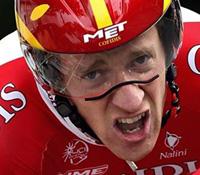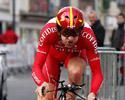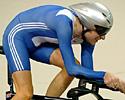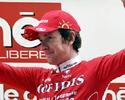
Recently on Cyclingnews.com |
An interview with Bradley Wiggins, June 12, 2007
Bradley Wiggins: An ambassador and a cyclist
His win in the prologue of the Dauphiné Libéré has changed the status of Bradley Wiggins. In London, he was officially an 'ambassador for cycling', now he's even a serious favourite for July 7's Tour de France prologue. Cyclingnews' Jean-François Quénet spoke with the Cofidis rider on Sunday night, after the 4.2-kilometre run.

|
When Bradley Wiggins turned professional with Française des Jeux in 2002, he was already trademarked as a contender for prologues. "Everyone knew I had the potential for doing things like Bradley McGee did," he recalled. When he came to the end of his two-year contract with his second French team, Crédit Agricole, in 2005, he had the choice between a few different destinations but he had set his mind. "My priority is the team that will take me in the ideal situation for the prologue of the Tour de France in London." Cofidis was the one.
The French squad gave him the opportunity to have a first taste of the Tour de France last year but he wasn't happy with finishing 16th in the prologue in Strasbourg. "I didn't understand why I wasn't doing as well in the prologues as I could on the track for the individual pursuit," he explained. "Last winter my coach, Chris Boardman, told me I was wrong to prepare for the prologues exactly the same way I did for the pursuits. On the track, I can stay for four minutes between 195 and 198 pulses, but there are many more parameters to take into consideration for the prologues."

|
The improvement is obvious. Wiggins, who had never won a time trial as a professional despite being a successful track rider, finally took the benefits of his preparation by claiming the prologues at the Four Days of Dunkirk and the Dauphiné. "Before that, it was only drunk people in pubs in London who were telling me 'Brad, you can win the prologue of the Tour,' so it didn't count in my mind," the Englishman stated after taking the honours in Grenoble. "Now it's different. I can really target the top five but I'm not the only one able to win, there'll be David Millar, David Zabriskie, George Hincapie, and Fabian Cancellara also."
"I grew up near Hyde Park, that's where I started cycling."- Wiggins on the Tour's prologue parcours. |
Wiggins has an advantage compared to the foreigners who have higher references than him in short time trials of the Tour de France: he knows everything about the prologue in London. "I grew up near Hyde Park, that's where I started cycling, and the route of the Tour de France will pass in Hyde Park! For me, it's the close of a circle."
He's the man with three passports: Belgian, Australian and British, because he was born in Gent, Belgium, of an English mother and an Australian father, who was a Six Day rider. Gary Wiggins returned alone to Tasmania and Bradley grew up with his mother in Maida Vale, just two kilometres away from the right centre of London.
For the prologue of the Tour de France, the authorities of London have clearly desired to take up the challenge launched by Paris when McGee took the first yellow jersey of the Centennial edition. As much as the riders from the 2003 Tour de France were able to ride in front of the most famous monuments of the French capital, they will start in London near Scotland Yard, head toward Big Ben, Westminster Abbey, Victoria Street, Buckingham Palace, Constitution Hill, Hyde Park corner, Serpentine road and the Mall along St-James Park.

|
"The Queen will be able to see the race," Wiggins announces. He is familiar with the royal habits of his country since he became Bradley Wiggins OBE (Order of British Empire) following the three medals he brought from Athens Olympics, gold in individual pursuit, silver in team pursuit and bronze for Madison. As a fan of music, he knows he's got the same rank in the British society as Mick Jagger. "If I win the prologue in London and the Olympics in London in 2012, maybe I'll become Sir, like Paul McCartney," he said with a large smile.
Wiggins was a disc-jockey before becoming a professional cyclist. He has a phenomenal culture of bike racing, with clear memories of which champion rode which bike and wore what kind of socks when he achieved something in particular. He has been a master for predicting what time he'd have to perform for the 2004 Olympics. He planned the prologue of the Tour in London two years in advance. But he never thought he'd be granted the status of "cycling ambassador for London" by Mayor Ken Livingstone, who has used him and his image for the promotion of the sport in conjunction with the 2007 Tour de France but also the 2012 Olympics.

|
"The Tour is a rehearsal for the Olympics," Wiggins reckons. "We expect three million spectators and we want the English public to love our sport the same way they love football. As a 'cycling ambassador,' I've given interviews to magazines like FHM and GQ, I've also been to schools to talk about cycling. For the kids, our cycling kits aren't cool like the shorts and jerseys of Wayne Rooney or David Beckham. But they have more sympathy for track cycling. They think it's more spectacular. It happens in a stadium. Hopefully the Tour will make them aware of the greatness of road cycling as well."
Last year at the Dauphiné, Wiggins climbed the Mont Ventoux for the first time. At the top, he was frustrated that he didn't see the memorial for Tom Simpson on the road side. He knows that English cycling can't only live with the myth of the man who died from heat, intense effort and amphetamines combined on the slopes of the Giant of Provence in 1967.
It's time for something new and fresh. The dual between Wiggins and Millar in London arrives at a perfect time.
